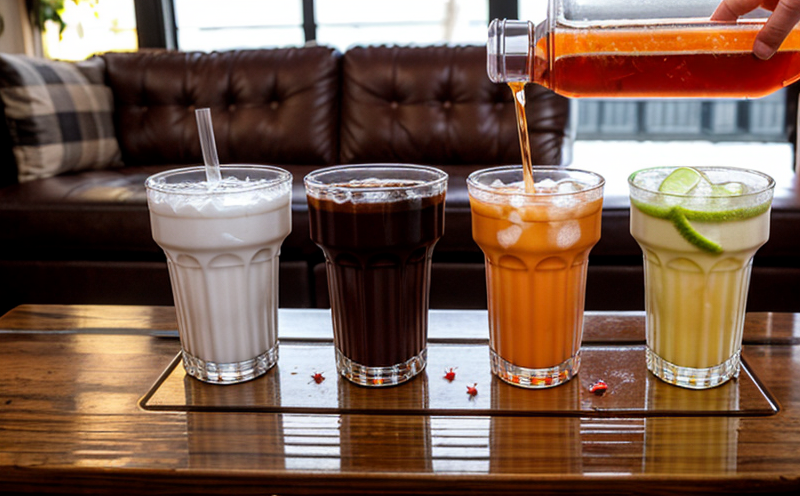ISO 14502 Polyphenol Quantification in Tea and Juice Drinks
The quantification of polyphenols is a critical parameter in ensuring product quality, safety, and compliance for tea and juice drinks. Polyphenols are natural antioxidants that play a significant role in determining the flavor, color, and health benefits of beverages. Our ISO 14502-1 service provides precise measurement of total polyphenol content using standardized methods to meet regulatory requirements and customer expectations.
The process begins with the selection of appropriate tea or juice samples for testing. Samples are carefully prepared according to industry best practices, ensuring they accurately represent the product. This preparation may include extraction procedures tailored to enhance the solubility of polyphenols, such as ultrasonic treatment or extended maceration times.
Once prepared, the sample is analyzed using advanced spectrophotometric techniques that adhere strictly to ISO 14502-1 guidelines. These methods involve measuring absorbance at specific wavelengths associated with polyphenol absorption in solutions. The calibration curve generated from this process allows for accurate quantification of total polyphenols present.
The precision and accuracy of the results are further enhanced by our state-of-the-art laboratory equipment, including multi-functional spectrophotometers capable of delivering consistent readings across multiple samples. Our analysts possess extensive experience in performing these types of analyses, ensuring reliable data generation that meets both internal standards as well as external regulatory bodies.
A key aspect of this service lies in its ability to detect even trace amounts of polyphenols within complex matrices such as teas and juices. This capability is crucial for maintaining consistent product quality over time while also identifying potential variations between batches or suppliers.
Our team works closely with clients throughout the entire testing process, providing guidance on sample selection, preparation methods, and interpretation of results. By leveraging our expertise in this area, businesses can gain valuable insights into their products' polyphenol content that will help them stay competitive in today's marketplace.
In conclusion, ISO 14502-1 offers a robust framework for quantifying total polyphenols in tea and juice drinks. Our service ensures accurate measurements through rigorous adherence to international standards combined with advanced analytical techniques. This approach supports your efforts towards maintaining high-quality products that meet both internal quality goals and external regulatory expectations.
Applied Standards
| Standard | Description | Year of Publication |
|---|---|---|
| ISO 14502-1:2016 | This international standard specifies procedures for the determination of total polyphenols in beverages by means of spectrophotometry. | 2016 |
| ASTM E739-18 | An American Society for Testing and Materials method detailing the use of UV-visible spectrophotometry to measure the absorbance characteristics of samples containing polyphenols. | 2018 |
Industry Applications
- Determining compliance with labeling claims regarding health benefits from polyphenol content.
- Monitoring production processes to ensure consistent product quality across batches.
- Identifying sources of variability in raw materials used in tea or juice formulations.
- Evaluating new products during development stages to optimize formulation for desired taste and nutritional profile.
Eurolab Advantages
At Eurolab, we pride ourselves on delivering unparalleled quality assurance services across various sectors including food & feed testing. Here are some reasons why choosing us can benefit your business:
- Compliance with international standards such as ISO 14502-1 and ASTM E739-18.
- Expertise in handling complex samples like teas and juices, ensuring accurate results even for challenging matrices.
- State-of-the-art laboratory facilities equipped with the latest analytical instruments to support precise measurements.
- Dedicated customer service team available to guide clients through every step of the testing process.
- Flexible turnaround times tailored to meet tight deadlines without compromising on accuracy or precision.
We understand that staying ahead in today's competitive market requires more than just meeting basic standards; it demands continuous improvement and innovation. By partnering with Eurolab for your ISO 14502-1 needs, you can rest assured knowing we'll provide the highest level of support to help drive success within your organization.





